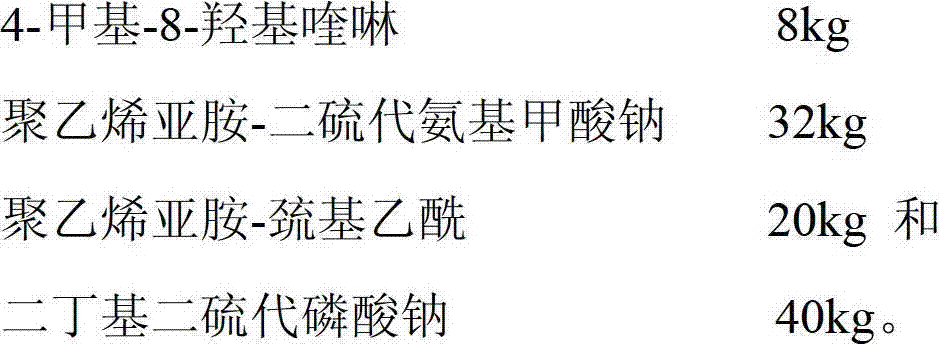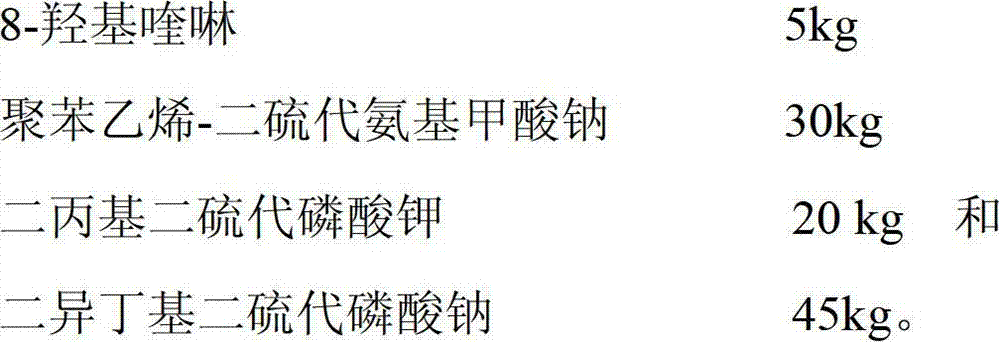Pharmaceutical compound for treating wastewater containing complex heavy metals and/or radioactive substances and application of pharmaceutical compound
A compound agent and heavy metal technology, applied in the direction of flocculation/sedimentation water/sewage treatment, etc., can solve the problems of no obvious effect of anion removal, high operating cost, difficult regeneration, etc., and achieve the effect of good sedimentation and enrichment effect
- Summary
- Abstract
- Description
- Claims
- Application Information
AI Technical Summary
Problems solved by technology
Method used
Image
Examples
Embodiment 1
[0028] Example 1: Complex polymetallic comprehensive wastewater treatment.
[0029] A compound agent (RM-1, custom brand) of the present invention that can be used to treat complex heavy metal and / or radioactive wastewater is prepared by mixing the following components evenly:
[0030]
[0031] Then use inorganic Mn, Zn, Cu, Hg, Cd, Pb, Cr, Ni salts to prepare wastewater samples containing various heavy metal ions as shown in Table 1 below, take out 100ml of water samples, place them in a beaker, and add A solution of 100mL of the above-mentioned composite drug with a mass concentration of 2% (the following percentages represent mass concentration unless otherwise specified) (the amount of the compound drug added in this example is 1.13 times the theoretical amount of heavy metals), after stirring for 5 minutes, it will produce A large number of metal complexes precipitate, then add 8ml, 1% concentration of magnesium hydroxide inorganic flocculant, stir for 5min, then add 0...
Embodiment 2
[0035] Example 2: Zinc oxide metallurgical wastewater treatment.
[0036] A compound agent (RM-2) of the present invention that can be used to treat complex heavy metal and / or radioactive wastewater is prepared by mixing the following components evenly:
[0037]
[0038] The zinc oxide metallurgical waste water of this embodiment is industrially leaching secondary zinc oxide powder with ammonium bicarbonate ammonia, steaming ammonia after removing impurities, reclaiming ammonia water for reuse to obtain basic zinc carbonate, washing with water and pressing filtration to produce comprehensive waste water ( Washing water, press filter water), the heavy metals and ammonia nitrogen contained in it are shown in Table 2 below. To the 100m of this embodiment 3 Add 10m of the solution of the above compound agent with a mass concentration of 3% in the waste water 3 (In this example, the amount of compound agent added is 1.4 times the theoretical amount of heavy metals). After stir...
Embodiment 3
[0042] Example 3: Treatment of metallurgical wastewater.
[0043] A compound agent (RM-3) of the present invention that can be used to treat complex heavy metal and / or radioactive wastewater is prepared by mixing the following components evenly:
[0044] 6-methyl-8-hydroxyquinoline 28kg
[0045] Sodium Polyethylene Polyamine Dithioformate 28kg and
[0046] Sodium diisopropyl dithiophosphate 44kg.
[0047] For the metallurgical wastewater in this example, different doses of the compound agent (RM-3) of this example were added, and the dosage was in the range of 0.5 to 1.5 times. The relationship between the addition and the treatment effect of heavy metals was tested, and the results are shown in Table 3 below. Show.
[0048] Table 3: The effect of the addition amount of the compound agent on the treatment effect
[0049]
[0050] It can be seen from Table 3 that the removal rate increases with the increase of the amount of compound agent added. The removal rate increas...
PUM
 Login to View More
Login to View More Abstract
Description
Claims
Application Information
 Login to View More
Login to View More - R&D
- Intellectual Property
- Life Sciences
- Materials
- Tech Scout
- Unparalleled Data Quality
- Higher Quality Content
- 60% Fewer Hallucinations
Browse by: Latest US Patents, China's latest patents, Technical Efficacy Thesaurus, Application Domain, Technology Topic, Popular Technical Reports.
© 2025 PatSnap. All rights reserved.Legal|Privacy policy|Modern Slavery Act Transparency Statement|Sitemap|About US| Contact US: help@patsnap.com



